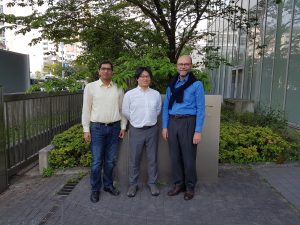TUHH and TokyoTech collaborate with support of Japan Society for the Promotion of Science (JSPS) to investigate relevance of frugal innovations in the context of Japan

Group photo (L2R): R. Tiwari, M. Tsujimoto and C. Herstatt at TokyoTech (Tamachi Campus)
The Hamburg University of Technology (TUHH) via its Center for Frugal Innovation at the Institute for Technology and Innovation Management, and the Tokyo Institute of Technology (TokyoTech) via its Department of Technology and Innovation Management at School of Environment and Society (Tamachi Campus), have decided to join hands to conduct joint research to investigate the phenomenon of frugal innovation in the Japanese context. At first, a preliminary research is being conducted with support from JSPS (Japan Society for the Promotion of Science) to generate initial impressions and take stock of the status-quo of frugal innovations in Japan. A mid-term objective is to conduct comparative studies between Germany and Japan with the objective of enabling mutual learnings.
Frugal innovations, originally thought to be directed primarily at resource-constrained customers in the countries of the economically developing world, are increasingly gaining relevance also in the context of industrialized nations. Recent stu dies at Center for Frugal Innovation, suggest that frugal products and services, as enablers of “affordable excellence”, are set to play an increasingly crucial role in ensuring long-term competitiveness of domestic firms in the unsaturated, growing economies of the “global south” as well as in home markets of the developed countries.
dies at Center for Frugal Innovation, suggest that frugal products and services, as enablers of “affordable excellence”, are set to play an increasingly crucial role in ensuring long-term competitiveness of domestic firms in the unsaturated, growing economies of the “global south” as well as in home markets of the developed countries.
A tendency to frugality is manifested, for example, in the increasing acceptance of “share economy” and desire of many consumers/users to avoid unnecessary complexity. Drivers of frugality – apart from obvious factors such as financial constraints – also include demographic developments and environmental concerns. These developments are leading many presently well-off customers to opt for products that are focused on core functions and can substantially reduce costs (especially the total cost of ownership/usage) while continuing to ensure high quality.
Such trends have been identified in Germany and other European nations. Germany’s Federal Ministry of Education and Research (BMBF) and the European Com mission have therefore recently started initiatives that support studies to investigate mid-to-long term implications of this trend. However, so far little research has been done on frugal innovations in the Japanese context, even though Japan as a key global player and known for developing high-quality, cost-effective solutions in a resource-constrained environment would, prima facie, seem to be an ideal case for a “lead market” for frugal innovations.
mission have therefore recently started initiatives that support studies to investigate mid-to-long term implications of this trend. However, so far little research has been done on frugal innovations in the Japanese context, even though Japan as a key global player and known for developing high-quality, cost-effective solutions in a resource-constrained environment would, prima facie, seem to be an ideal case for a “lead market” for frugal innovations.
The current research is being generously supported by JSPS. On invitation of Associate Professor Masaharu T![]() sujimoto of TokyoTech, Prof. Dr. Cornelius Herstatt and Dr. Rajnish Tiwari of TUHH are conducting field visits of 4-weeks duration each (with overlap total 6 weeks), in Japan to carry out case studies and interview relevant stakeholders. While Prof. Herstatt has returned to Germany upon completion of his research, Dr. Tiwari will be in Japan till mid-May to carry forward the research. Prof. Herstatt has been awarded a fellowship within the short-term invitation research program by JSPS, while Dr. Tiwari has received a short-term Postdoctoral Fellowship for Overseas Researchers.
sujimoto of TokyoTech, Prof. Dr. Cornelius Herstatt and Dr. Rajnish Tiwari of TUHH are conducting field visits of 4-weeks duration each (with overlap total 6 weeks), in Japan to carry out case studies and interview relevant stakeholders. While Prof. Herstatt has returned to Germany upon completion of his research, Dr. Tiwari will be in Japan till mid-May to carry forward the research. Prof. Herstatt has been awarded a fellowship within the short-term invitation research program by JSPS, while Dr. Tiwari has received a short-term Postdoctoral Fellowship for Overseas Researchers.
This research follows on a feasibility study that Dr. Tiwari had conducted in February/March 2015 while being hosted at the laboratory of Prof. Shuzo Fujimura of TokyoTech. At that time Prof. Herstatt and Dr. Tiwari had also conducted a seminar on “Advanced MOT Research”, which included familiarizing Master-level and Ph.D. students of TokyoTech with the concept of frugal innovation; apart from dealing with issues of methodologies of quanitative and qualitative research and with intercultural management. Prof. Tsujimoto was a visiting professor at TIM/TUHH in Winter term 2014/15 and at that time also delivered a guest talk on “Japanese Business Culture and Social System Design Competition” in a course of Dr. Rajnish Tiwari on “Intercultural Management and Communication“. These are just a few examples of past collaboration between TUHH and TokyoTech. The present research, thus, marks a continuation of the long-term collaboration between the two institutions in a broad range of innovation research that also includes “silver age”.
The results of the research shall be published in relevant mediums and also be made available to the interested public-at-large. The research team is thankful to JSPS (especially its Bonn Office), as well as to German Academic Exchange Service (DAAD), as the coordinating agency for these fellowships, for supporting this research and cementing German-Japanse collaboration in academic research.
For any queries related to this project please contact:
- Prof. Dr. Masaharu Tusjimoto (TokyoTech)
- Dr. Rajnish Tiwari (TUHH)
